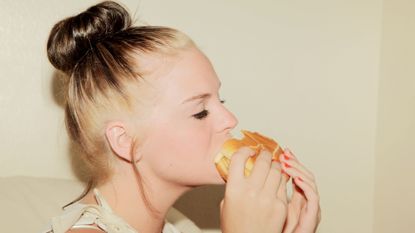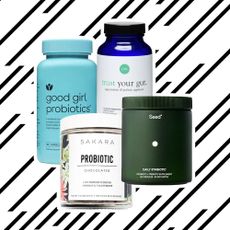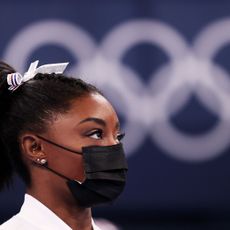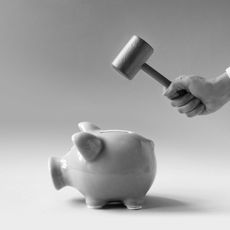

"I'd rather die than live on a diet like this."
"Seriously, this is one of the most depressing things I've ever read."
"What a lovely diet! I'm off to chew some tree bark and breathe gifted air from Alexander Wang."
"She eats so little a person could eat her entire daily diet in one meal and still have room to spare for carbs."
What is it about food that riles us up so much? All the comments above come from food diaries published online—as in notable/interesting people documenting what they eat. And you thought the Kardashians were divisive.
Through food, you can make connections to health and bodies and beauty and pretty much any issue you like, but there's a deeper internal drive that, most often, compels us to shame others for eating in a way that doesn't align with our own habits. On one level, it has to do with "moralization of food choice," says Paul Rozin, psychology professor at the University of Pennsylvania.
Think of it this way: Like a vegetarian censuring a meat-eater, a food-shamer will criticize someone who doesn't meet her definition of "good." The weird thing is that her idea of "good" could just as easily be a chia pod or a full-fat, finished-with-butter chocolate pudding—health doesn't seem to matter.
Stay In The Know
Marie Claire email subscribers get intel on fashion and beauty trends, hot-off-the-press celebrity news, and more. Sign up here.
Take Kara Rosen, for example. The juice entrepreneur recently shared her vegetable-heavy, model-New-Yorker "Day on a Plate" with the Telegraph, which launched a thousand social-media tirades—some of which you see above—and even more snarky parodies. Her crime, as she told the Independent? "I happen to like kale, nuts, and avocado…Plant-based food is what makes me feel good."
Strong feelings—about ourselves and our relationships with food—also prompt people to food-shame, says Aner Tal, a research associate in Cornell University's Food and Brand Lab.
"In some cases, the internal monitoring that goes on with one's own food choices gets projected onto the outside world," Tal says. "In a way, being critical of other's choices is just externalizing the criticism or self-control you apply to yourself."
So basically we're all just insecure sixth-graders who lash out because we don't know what we're doing, yet we somehow want everyone else to do what we're doing.
There's still some truth in the ravings that accompany this totally illogical thought process, though. Venture into the comment section, synthesize a bit, and you'll come up with the formula for a good, unobjectionable, food-shaming-proof diet: Healthy but not never-have-a-cheat-day healthy. Pleasurable without getting too A.J. Liebling-esque. Basically, eat what feels right for you and really enjoy it—and don't let anyone tell you otherwise.
You should also check out:
This Is What Eating 8,000 Calories a Day Actually Looks Like
Is the Biggest Loser Controversy Just Another Example of Fat-Shaming?

Chelsea Peng is a writer and editor who was formerly the assistant editor at MarieClaire.com. She's also worked for The Strategist and Refinery29, and is a graduate of Northwestern University. On her tombstone, she would like a GIF of herself that's better than the one that already exists on the Internet and a free fro-yo machine. Besides frozen dairy products, she's into pirates, carbs, Balzac, and snacking so hard she has to go lie down.
-
 Celebrate Earth Month With Our Feel-Good Fashion Report
Celebrate Earth Month With Our Feel-Good Fashion ReportYour guide to being more sustainable in 2024.
By Anneliese Henderson Published
-
 Anne Hathaway Details the "Gross" Audition Request She Once Endured
Anne Hathaway Details the "Gross" Audition Request She Once Endured"Now we know better."
By Meghan De Maria Published
-
 The Emotional Ending of 'Baby Reindeer,' Explained
The Emotional Ending of 'Baby Reindeer,' ExplainedNetflix's latest miniseries from Richard Gadd is based on the true story of the comedian and his stalker.
By Quinci LeGardye Published
-
 Senator Klobuchar: "Early Detection Saves Lives. It Saved Mine"
Senator Klobuchar: "Early Detection Saves Lives. It Saved Mine"Senator and breast cancer survivor Amy Klobuchar is encouraging women not to put off preventative care any longer.
By Senator Amy Klobuchar Published
-
 How Being a Plus-Size Nude Model Made Me Finally Love My Body
How Being a Plus-Size Nude Model Made Me Finally Love My BodyI'm plus size, but after I decided to pose nude for photos, I suddenly felt more body positive.
By Kelly Burch Published
-
 I'm an Egg Donor. Why Was It So Difficult for Me to Tell People That?
I'm an Egg Donor. Why Was It So Difficult for Me to Tell People That?Much like abortion, surrogacy, and IVF, becoming an egg donor was a reproductive choice that felt unfit for society’s standards of womanhood.
By Lauryn Chamberlain Published
-
 The 20 Best Probiotics to Keep Your Gut in Check
The 20 Best Probiotics to Keep Your Gut in CheckGut health = wealth.
By Julia Marzovilla Published
-
 Simone Biles Is Out of the Team Final at the Tokyo Olympics
Simone Biles Is Out of the Team Final at the Tokyo OlympicsShe withdrew from the event due to a medical issue, according to USA Gymnastics.
By Rachel Epstein Published
-
 The Truth About Thigh Gaps
The Truth About Thigh GapsWe're going to need you to stop right there.
By Kenny Thapoung Published
-
 3 Women On What It’s Like Living With An “Invisible” Condition
3 Women On What It’s Like Living With An “Invisible” ConditionDespite having no outward signs, they can be brutal on the body and the mind. Here’s how each woman deals with having illnesses others often don’t understand.
By Emily Shiffer Published
-
 The High Price of Living With Chronic Pain
The High Price of Living With Chronic PainThree women open up about how their conditions impact their bodies—and their wallets.
By Alice Oglethorpe Published